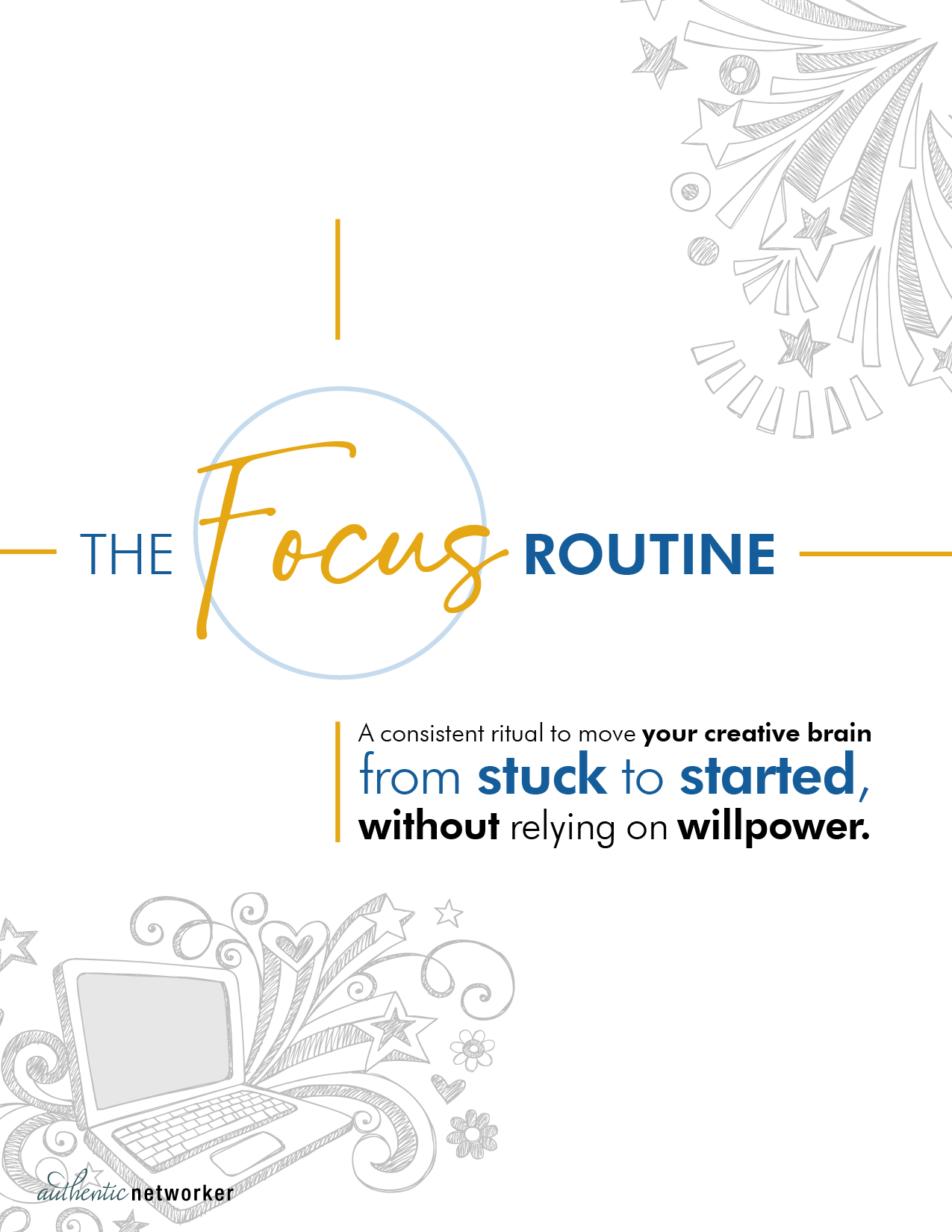Making Stolen Moments Count: Productivity in 15 Minutes or Less


What if you never get the time you think you need? This episode explores how to create meaningful work in the tiny stolen minutes life actually gives you. It’s for anyone who swears they’ll finally get to it when they have a golden, uninterrupted day. Spoiler: You’re gonna have to get scrappy.
What if you never get the time you think you need? This episode explores how to create meaningful work in the tiny stolen minutes life actually gives you. It’s for anyone who swears they’ll finally get to it when they have a golden, uninterrupted day. Spoiler: You’re gonna have to get scrappy.
Let's talk about messy entrepreneurship, late-night email drafts, and the weird little brain gymnastics required to keep going when your context keeps breaking.
****
✨ How this episode is meta✨
I recorded and edited in one sitting. I'd built myself a blanket fort to sit in because I read this would dampen outside noise. It did way too good a job and some of my consonants are just... missing. Wooed away by the lure of blankets and the magic of sitting in a fort in the living room.
But I did NOT rerecord. I listened to it. You guys I'm talking way too fast. And the audio is choppy. but GUESS WHAT I ONLY TOOK A SMALL WINDOW TO DO IT and f✨k perfectionism. I am determined to walk my talk y'all. Enjoy the episode.
****
Bonuses: research that will help you feel better about interruptions, legendary writers who squeezed magic out of the margins, and how I trained my focus like a defiant puppy.
If your brain feels allergic to transitions, if your to-do list keeps laughing at you, if you’ve been waiting for perfect conditions—you need this. I'm with you.
-----------------------
In Case You Need to Show This to a Doubter
Mark, G., Gudith, D., & Klocke, U. (2008). The cost of interrupted work: More speed and stress. Proceedings of the SIGCHI Conference on Human Factors in Computing Systems , 107–110. https://doi.org/10.1145/1357054.1357072
-----------------------
🎯 The Focus Routine If 15 minutes is all you’ve got, make it count. Download my free Focus Routine—your ADHD-friendly starter ritual that helps you go from chaos to clarity faster than your coffee kicks in. 👉 authenticnetworker.com/focusroutine
-----------------------
🌊 Wavelength Wish you had someone to sit beside you while you tackle that next big (or tiny) thing? Wavelength is my virtual coworking community designed for brilliant, interrupted brains like yours. Super awesome people. Like you! And me! Come on in. 👉 authenticnetworker.com/wavelength
Have you ever felt like relentless chaos is pulling the plug on your focus right when you finally find it?
Today, I'm sharing what I learned about creating in stolen moments, how to rethink productivity, and why forward motion doesn't require perfect conditions.
Three, two, one. Let's go. Welcome to Transition Space, your gateway from thinking to doing. I'm Mia Torr. If you're called to create meaningful work, use this podcast as part of your starting ritual. Make your coffee and clear your desk while you listen, and we'll hang out as you ease into focused flow. While you create your space, I'll help you entertain the transition. Come on in.
Today on Transition Space, a story about creating in the spaces between everything else.
When life won't give you room to breathe, there's a strange kind of resourcefulness that kicks in. It turns out scarcity can make a thief out of anyone. Some of you want gold. Other people want their moment in the spotlight. Me, I didn't want riches or glory. I just wanted one freaking minute to write something down.
I became a time thief.
For years, I have stolen moments to work wherever I could find them. Waiting room chairs, standing in lines. The precious minutes between each person who needed me. To me, being part of the sandwich generation has felt less like being a lunchbox sandwich and more like being the soggy filling in a panini press. My whole life compressed into these impossibly thin slices of time. Tasty snack though I am, I have been feeling flattened and burnt and probably leaking cheese everywhere.
This kind of pressure, it turns out there's research for that. Thanks to a study from UC Irvine I am delighted to share science-backed proof that I'm not just being dramatic.
Researchers followed office workers around. Okay, and for some of you researchers, do you actually follow these people around? Do you blend into the walls? Because I picture you dressed up like a plant. I don't know. Fill me in.
These people followed the office workers around, tracking exactly what happened after each interruption. Every slack ping, every tap on the shoulder, every, hey, real quick moment.
What they found was kind of brutal. It took an average of 23 minutes for people to regain full focus after each disruption.
These employees wanted to refocus. I mean, they had researchers watching them from behind the plants, you know, but you know what it's like when you return to what you were doing before the interruption and you have to recalibrate.
Your brain needs to rebuild the mental context, re enter the zone. This kind of thing takes time.
It is no wonder we fall apart trying to run a business from the kitchen table in a life full of constant disruptions. I might get 15 minutes here, 10 minutes there. But some days it is a miracle if I were to get those full 23 minutes to recover. For me, 23 minutes feels like enough time to brew another coffee. And then like I watch a video of ducks running across the kitchen tile. You know, they're so cute. And then I hide for a moment in the bathroom, trying to redraw my smudged eyeliner before the next zoom meeting. And that's it. That's what we're working with. It's the space between one interruption and another.
But I am guilty of seeing these tempting open blocks on tomorrow's calendar. Do you have those? They're these mythical blocks from 2 to 4pm you see tomorrow and you imagine it's going to be this productivity oasis. I'd see them and I'd think, ooh, uninterrupted time. And then I get to that time and I'm served up more interruptions and more needs and more exhaustion.
And every time I beat myself up hard because I'm not feeling productive enough.
I took my therapist to point out something crucial. I was beating myself up, as usual, so hard for not feeling productive enough. It had been a week of drop offs and deadlines and hospital visits and cereal for dinner.
And she didn't flinch. She just channeled some deep inner wisdom and she looked at me and said, do you hear how much you're holding right now?
And then without skipping a beat, she said, the work you're doing for your family, Mia, it is so important. You will never regret the time you spend with them. And we don't value it nearly enough. If you only measure your worth by what you produce, you're going to start resenting the people you love.
That idea floored me. Okay, it was a little bit of harsh love, but it was so true. I realized I'd been quietly treating caregiving like an obstacle to my creativity instead of honoring it as the reason for my creativity and part of my life's deepest work.
I didn't even realize until that moment how much guilt and shame I'd been holding in about my lack of perceived productivity. I just knew I had this knot constantly in my belly about wanting to do more and believing somehow that I needed these big open blocks of uninterrupted time before I could do that.
Before we finished talking that day, I remember her saying one more thing to me. It was something like, don't underestimate the growth that happens in the small, quiet moments every Tiny step forward still counts. Even if it doesn't feel perfect. If it moves you forward even just a little bit, it matters.
I'm going to be the first to admit that my moments of downtime often have nothing to do with creative pursuits. I need them for self-care. Sometimes I just have to put my head down to nap, or remember to hydrate for the first time in the day, or just breathe in the midst of burnout. These stolen moments became survival spaces.
And that's okay too. Sometimes the most productive thing you can do is rest, even if it's just for 15 minutes between crises.
This seems like the perfect moment to address the hustle culture elephant that is in this room because it is big and it is stinky. And I don't want to suggest for a second that it's necessary for most people or healthy to force productivity into every moment of downtime that you have. But if you do want to use that time, or you need to use that time, that starts by actively choosing to define that time for yourself and to use it in a way that is most healthy and productive for your brain and your situation.
Your life probably looks very different than mine. Maybe you're not juggling kids and aging parents. Maybe you're managing chronic illness while building a business. Maybe you're balancing full time work against your creative pursuits. Or you're working through serious adversity and trying to pursue your dreams on the side. But whatever your version of the juggling act looks like, switching between roles takes a toll that's rarely acknowledged.
When I'm constantly changing hats like this. Of course, I long to be the writer who retreats to my cabin or uninterrupted.
But the stories that inspire me most are the messy stories of successful creative work that was created in carpool lanes and kitchen corners and notebooks next to diaper bags. That is what speaks to me.
Alice Munro wrote short stories in 45 minute bursts between loads of laundry while raising three young children. She couldn't wait for perfect conditions, and so she learned to work with what she had. Those constraints actually helped shape her style. They taught her how to compress time in her stories the same way she compressed her writing time in real life.
The doctor and author William Carlos Williams wrote some of America's most memorable poems between seeing patients. As a pediatrician, he kept a prescription pad by his side. So I imagine one patient went and he would scribble some poetry and another patient would come in. Those stolen moments produced the Red wheelbarrow, which were 16 words that changed American poetry.
And then there's Barbara Kingsolver whom I love. She wrote her first novel, the Bean Trees in 15 minute increments while her baby napped. Her secret I love this. It's different notebooks for different energy levels. A tired brain might not write a chapter, but it could edit one written yesterday.
I read stories like this and I had to challenge myself to reframe my thinking instead of thinking a short moment was not enough time. I had to lean into it as exactly the time I have. And I'm not going to lie, this wasn't easy for me.
I'm wired to dramatically resist this kind of rapid fire task switching my fight or flight response fires and it triggers all kinds of resistance and it took a lot of repeated practice to get past the suck and start becoming more effective using less time.
Here is the point where my vulnerability has to come creeping in. Let's welcome her to the party for a moment. Her name is Cricket. Yes, I have named my sense of vulnerability Cricket because she has a small voice and a big heart and a brave song.
Although sometimes she does get stuck under the couch.
Cricket is here to announce that she imagines some of you listening and just rolling your eyes and going, Mia. What the f*ck is your problem? Of course you have to make use of that time, Sherlock.
Or maybe you're saying what is the deal with all this drama and complaining? Just stop. Just get started.
Because that is what the voice in my head says when I'm paralyzed by overwhelm. It's judgmental and it's mean.
And the uncomfortable crickety truth is that I am prone to absolute ADHD paralysis. My brain is like an excitable stubborn puppy that will not cooperate if the conditions aren't quite right. This puppy is not going to go pee in the rain. Thank you.
And just like a patient exasperated trainer, I had to condition my brain through repetition and doggy treats and strategic dopamine rewards that this weird rhythm was in fact a safe, acceptable way to work.
It felt a lot like when I trained myself to catnap when my kids were babies and I could only steal 15 minutes of sleep at a time, but I was so tired that all I wanted to do was sleep for three days.
This mindset shift helped make it possible for me to relaunch my business.
I started keeping a working OneNote document and I could access it on my phone or my iPad or my computer, whatever was handy and it became this organized running place to jot ideas or edit scripts or draft emails anytime I had a sliver of space I'd create when I had the bandwidth, when I'd edit or poke around with progress when the time was shorter.
The best thing I did to speed up my transitions was when I started leaving myself little notes at the bottom of every entry, like a breadcrumb trail. I'd write next time, finish this idea. Or pick up here with podcast edits or this line needs trimming. Don't overthink it.
Adding that little tiny note, a thread of continuity, meant I didn't have to start from zero every time. It helped to orient me fast, and it made it so much easier to dive back in in the short moments.
I edited episodes this way. I edited this episode this way. I drafted launch emails. I mapped out an entire business rebrand in the margins of real life. Eventually, not at first, but eventually, that rhythm became its own kind of normal. I had to let go of my dreams of hiding out in a monastery for these long, imaginary, uninterrupted days.
Learning to work with what I have made me feel so much stronger and more capable as a result.
Maybe you have your own version of this situation. It could be work you have to do or work you want to do, like some tantalizing project or idea you'd love to act on, but you just haven't. And maybe, just maybe, there is a chance you could plausibly make use of those itty bitty moments to move your work forward, even if just by inches.
In this beautiful, heart-centered, interruption-driven life that I am living, the most important thing I can share with you is that if you wait for perfect conditions, progress will never happen. Give yourself gentle support as you resist that urge to write off the messy stolen moments. Be deliberate about choosing to show up mindfully in the time you do have, and embrace as many steps forward as you're able, no matter how many or how few they are.
I promise that if I can do this, me, you can do this. These moments can be a gift to your life.
So stop waiting for a monastery and a clean desk. This is your creative monastery now. This space. This moment. This beautiful stolen breath of time.
Be the time thief and steal the time. Work with what you've got. It's enough time to take a crack at your dent in the universe.
Whether you're making coffee or arranging your desk right now. Give yourself permission to use these in between moments to create something meaningful in whatever time you have to. Let these transitions become bridges instead of barriers.
I'd love to hear how you use your stolen moments. Visit authenticnetworker.com/transitionspace and share, What can you embrace in 15 minutes?
This is transition space, where you clear your path from thinking to doing. I'm Mia and together we've shaped what's possible. Now it's your turn to make it real.



